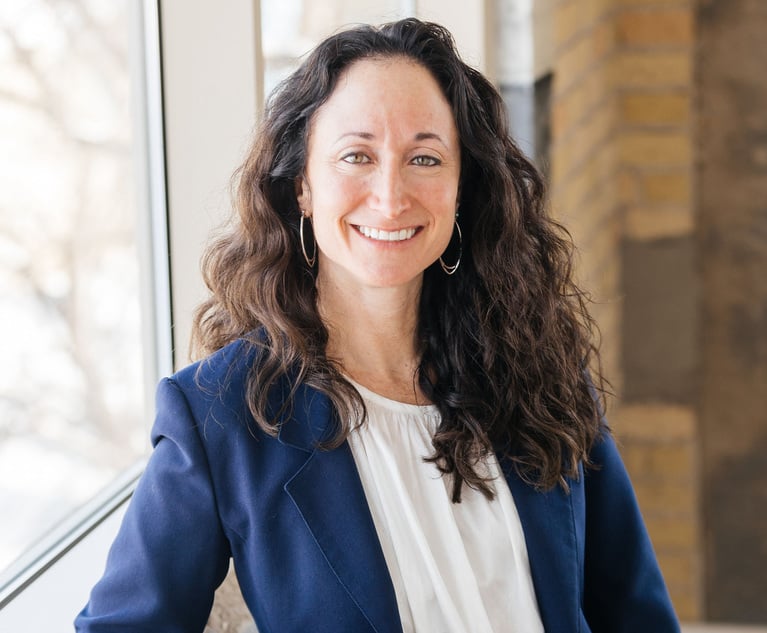'No' to Con-Con. 'Yes' to Article-by-Article Constitutional Revision
Instead of building a corrupt entity (a 2019 constitutional convention) which would parallel an existing corrupt entity (the legislature), advocates of a 2019 constitutional convention should direct their energies to forming a slate of not-corrupt candidates for all Senate seats and for all Assembly seats.
November 01, 2017 at 02:54 PM
4 minute read
 The constitutional convention held in 1967 was “full of sound and fury” and, in the end, “signif[ied] nothing.” William Shakespeare, Macbeth, Act V, Scene 5. The vote was 1.3 million in favor and 3.5 million against the proposed constitution.
The constitutional convention held in 1967 was “full of sound and fury” and, in the end, “signif[ied] nothing.” William Shakespeare, Macbeth, Act V, Scene 5. The vote was 1.3 million in favor and 3.5 million against the proposed constitution.
In relation to a constitutional convention in 2019, there are lessons to be drawn:
• An effort to change everything at once will fail. “Rome wasn't built in a day.”
• Delegates to the 1967 constitutional convention were not philosopher-kings. They were representatives of special interests. Upstate, suburbs and downstate. Management and union. Producers and moochers. The 1967 constitutional convention was rendered thereby ineffective. A similar circumstance will cause a 2019 constitutional convention to be ineffective.
• In 2019, the number of delegates would be 204. Nothing can be accomplished by a mob.
Compare that large number of delegates and the small number of delegates who met in Philadelphia for the Convention of 1787 (55).
What's more, the men of 1787 were educated, talented, experienced, battle-hardened and patriotic. Who, today, compares with any of them?
• The most-needed constitutional changes:
(a) A unicameral legislature, the New York Assembly, must be established. There must be creation of the initiative and of the referendum. However, politicians will fight elimination of their monopoly to legislate.
(b) All New York governmental units, at all levels, are indebted up to their eyeballs. Interest payments on public bonds consume billions of dollars every year. Therefore, all borrowing, direct or indirect, by the state or any subdivision or any instrumentality, must be prohibited. However, politicians will fight to keep the spigot open.
(c) The structure of state trial courts and appellate courts must be simplified, provided the traditional names of the major courts—Supreme Court, Appellate Division, Court of Appeals—are retained. Only two modes of elevation to the bench must be used. Nomination by the governor, and confirmation by the Senate, for appellate positions. Elections for trial positions. However, politicians will fight to continue their misuse of judgeships as slots for rewarding supporters.
• Voters, too, will fight needed constitutional changes. The progressive poop added to the New York Constitution in 1938 must be swept away. The impediment is New York City voters. They would reject outright a return to Americanism from New Deal socialism.
On the ballot question of holding a constitutional convention, New York State voters should vote “No.”
The solution is piecemeal constitutional revision.
There are 20 articles in the New York Constitution. If, after the floperoo 1967 constitutional convention, article-by-article constitutional revision had been put before the electorate at the 1970 general election and every 2 years thereafter, the job would have been done, theoretically, in 40 years, i.e., by the 2008 general election.
In practice, 32 years, i.e., by 2000. Some articles, such as article IV (Executive) and article V (Officers and Civil Departments) would have been considered together.
A point made by advocates of a 2019 constitutional convention is that the legislature is corrupt. That is a truism. All politics is corrupt.
Instead of building a corrupt entity (a 2019 constitutional convention) which would parallel an existing corrupt entity (the legislature), advocates of a 2019 constitutional convention should direct their energies to forming a slate of not-corrupt candidates for all Senate seats and for all Assembly seats. The slate would challenge incumbent corruptocrats with not-corrupt newcomers.
Assume that, in 2018, voters elect the slate. The first-ever not-corrupt legislature in New York State history would be brought into existence. It is that legislature, and its successors, which can undertake to revise the New York Constitution, article by article, every two years, beginning in the 2022 general election.
The writer is a lawyer. He wrote eight essays on needed revisions of the New York Constitution. Among the essays is “New Judiciary Article for the New York Constitution”. http://ssrn.com/abstract=1455502.
Comments? Write to the author on [email protected].
This content has been archived. It is available through our partners, LexisNexis® and Bloomberg Law.
To view this content, please continue to their sites.
Not a Lexis Subscriber?
Subscribe Now
Not a Bloomberg Law Subscriber?
Subscribe Now
NOT FOR REPRINT
© 2025 ALM Global, LLC, All Rights Reserved. Request academic re-use from www.copyright.com. All other uses, submit a request to [email protected]. For more information visit Asset & Logo Licensing.
You Might Like
View All
‘Catholic Charities v. Wisconsin Labor and Industry Review Commission’: Another Consequence of 'Hobby Lobby'?
8 minute read
AI and Social Media Fakes: Are You Protecting Your Brand?

Neighboring States Have Either Passed or Proposed Climate Superfund Laws—Is Pennsylvania Next?
7 minute read
Trending Stories
- 15th Circuit Considers Challenge to Louisiana's Ten Commandments Law
- 2Crocs Accused of Padding Revenue With Channel-Stuffing HEYDUDE Shoes
- 3E-discovery Practitioners Are Racing to Adapt to Social Media’s Evolving Landscape
- 4The Law Firm Disrupted: For Office Policies, Big Law Has Its Ear to the Market, Not to Trump
- 5FTC Finalizes Child Online Privacy Rule Updates, But Ferguson Eyes Further Changes
Who Got The Work
J. Brugh Lower of Gibbons has entered an appearance for industrial equipment supplier Devco Corporation in a pending trademark infringement lawsuit. The suit, accusing the defendant of selling knock-off Graco products, was filed Dec. 18 in New Jersey District Court by Rivkin Radler on behalf of Graco Inc. and Graco Minnesota. The case, assigned to U.S. District Judge Zahid N. Quraishi, is 3:24-cv-11294, Graco Inc. et al v. Devco Corporation.
Who Got The Work
Rebecca Maller-Stein and Kent A. Yalowitz of Arnold & Porter Kaye Scholer have entered their appearances for Hanaco Venture Capital and its executives, Lior Prosor and David Frankel, in a pending securities lawsuit. The action, filed on Dec. 24 in New York Southern District Court by Zell, Aron & Co. on behalf of Goldeneye Advisors, accuses the defendants of negligently and fraudulently managing the plaintiff's $1 million investment. The case, assigned to U.S. District Judge Vernon S. Broderick, is 1:24-cv-09918, Goldeneye Advisors, LLC v. Hanaco Venture Capital, Ltd. et al.
Who Got The Work
Attorneys from A&O Shearman has stepped in as defense counsel for Toronto-Dominion Bank and other defendants in a pending securities class action. The suit, filed Dec. 11 in New York Southern District Court by Bleichmar Fonti & Auld, accuses the defendants of concealing the bank's 'pervasive' deficiencies in regards to its compliance with the Bank Secrecy Act and the quality of its anti-money laundering controls. The case, assigned to U.S. District Judge Arun Subramanian, is 1:24-cv-09445, Gonzalez v. The Toronto-Dominion Bank et al.
Who Got The Work
Crown Castle International, a Pennsylvania company providing shared communications infrastructure, has turned to Luke D. Wolf of Gordon Rees Scully Mansukhani to fend off a pending breach-of-contract lawsuit. The court action, filed Nov. 25 in Michigan Eastern District Court by Hooper Hathaway PC on behalf of The Town Residences LLC, accuses Crown Castle of failing to transfer approximately $30,000 in utility payments from T-Mobile in breach of a roof-top lease and assignment agreement. The case, assigned to U.S. District Judge Susan K. Declercq, is 2:24-cv-13131, The Town Residences LLC v. T-Mobile US, Inc. et al.
Who Got The Work
Wilfred P. Coronato and Daniel M. Schwartz of McCarter & English have stepped in as defense counsel to Electrolux Home Products Inc. in a pending product liability lawsuit. The court action, filed Nov. 26 in New York Eastern District Court by Poulos Lopiccolo PC and Nagel Rice LLP on behalf of David Stern, alleges that the defendant's refrigerators’ drawers and shelving repeatedly break and fall apart within months after purchase. The case, assigned to U.S. District Judge Joan M. Azrack, is 2:24-cv-08204, Stern v. Electrolux Home Products, Inc.
Featured Firms
Law Offices of Gary Martin Hays & Associates, P.C.
(470) 294-1674
Law Offices of Mark E. Salomone
(857) 444-6468
Smith & Hassler
(713) 739-1250






